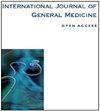舌鳞状细胞癌预后可通过 LncRNA LIPH4 有效预测:一项前瞻性研究
IF 2.1
4区 医学
Q2 MEDICINE, GENERAL & INTERNAL
引用次数: 0
摘要
目的:LIPH4已被确定为不同恶性疾病中的致癌lncRNA。本研究旨在阐明舌鳞状细胞癌(TSCC)中 LIPH4 的表达与其预后应用之间的联系:方法:为了评估 LIPH4 的表达,研究人员对符合选择参数的 142 例 TSCC 和正常病例进行了 qRT-PCR 分析。此外,还通过Chi-square检验确定了LIPH4表达与TSCC临床病理特征的相关性。此外,Kaplan-Meier检验用于计算存活率,而患者存活率与预后因素的关系则借助Cox比例危险分析进行评估:数据显示,与健康样本相比,TSCC样本中的LIPH4水平上调。此外,LIPH4的表达与TSCC的分化和分期有关,表达增加表明无病生存率(DFS)和总生存率(OS)降低。此外,LIPH4表达增强的晚期TSCC患者的OS和DFS率低于LIPH4表达降低的患者。血清 LIPH4 可作为 TSCC 的诊断生物指标,其曲线下面积为 0.8920(95% CI = 0.8540-0.9299)。这些数据表明,LIPH4的过表达可能是独立预测TSCC患者OS和DFS率的重要预后因素:关键词:lncRNA;LIPH4;生物标志物;舌鳞状细胞癌(TSCC)本文章由计算机程序翻译,如有差异,请以英文原文为准。
Tongue Squamous Cell Carcinoma Prognosis Can Be Effectively Predicted by LncRNA LIPH4: A Prospective Study
Purpose: LIPH4 has been identified as an oncogenic lncRNA in different malignant diseases. This research aims to elucidate the link between the expression of LIPH4 and its prognostic application in tongue squamous cell carcinoma (TSCC).
Methods: To assess the expression of LIPH4, 142 TSCC and normal cases, respectively, which met the selection parameters, were used for qRT-PCR analysis. Furthermore, the association of LIPH4 expression with TSCC’s clinicopathological features was identified via the Chi-square test. Moreover, the Kaplan–Meier test was used for calculating the survival rates, whereas the association of patient survival with prognostic factors was assessed with the help of Cox proportional hazard analysis.
Results: The data indicated upregulated LIPH4 levels in TSCC samples than healthy samples. Furthermore, LIPH4 expression was associated with TSCC differentiation and stage, where increased expression indicated reduced disease-free survival (DFS) and overall survival (OS) rates. Additionally, advanced TSCC individuals with enhanced LIPH4 expression had reduced OS and DFS rates than those with reduced LIPH4 expression. Serum LIPH4 could be a promising diagnostic bio-index for TSCC, with an area under the curve of 0.8920 (95% CI = 0.8540– 0.9299). These data revealed that the overexpression of LIPH4 might be a substantial prognostic factor for independently predicting the OS and DFS rates of TSCC patients.
Conclusion: Altogether, this research revealed that the expression of LIPH4 expression is closely associated with TSCC progression and, therefore, can be employed as a biomarker for its prognosis.
Keywords: lncRNA, LIPH4, biomarker, tongue squamous cell carcinoma (TSCC)
Methods: To assess the expression of LIPH4, 142 TSCC and normal cases, respectively, which met the selection parameters, were used for qRT-PCR analysis. Furthermore, the association of LIPH4 expression with TSCC’s clinicopathological features was identified via the Chi-square test. Moreover, the Kaplan–Meier test was used for calculating the survival rates, whereas the association of patient survival with prognostic factors was assessed with the help of Cox proportional hazard analysis.
Results: The data indicated upregulated LIPH4 levels in TSCC samples than healthy samples. Furthermore, LIPH4 expression was associated with TSCC differentiation and stage, where increased expression indicated reduced disease-free survival (DFS) and overall survival (OS) rates. Additionally, advanced TSCC individuals with enhanced LIPH4 expression had reduced OS and DFS rates than those with reduced LIPH4 expression. Serum LIPH4 could be a promising diagnostic bio-index for TSCC, with an area under the curve of 0.8920 (95% CI = 0.8540– 0.9299). These data revealed that the overexpression of LIPH4 might be a substantial prognostic factor for independently predicting the OS and DFS rates of TSCC patients.
Conclusion: Altogether, this research revealed that the expression of LIPH4 expression is closely associated with TSCC progression and, therefore, can be employed as a biomarker for its prognosis.
Keywords: lncRNA, LIPH4, biomarker, tongue squamous cell carcinoma (TSCC)
求助全文
通过发布文献求助,成功后即可免费获取论文全文。
去求助
来源期刊

International Journal of General Medicine
Medicine-General Medicine
自引率
0.00%
发文量
1113
审稿时长
16 weeks
期刊介绍:
The International Journal of General Medicine is an international, peer-reviewed, open access journal that focuses on general and internal medicine, pathogenesis, epidemiology, diagnosis, monitoring and treatment protocols. The journal is characterized by the rapid reporting of reviews, original research and clinical studies across all disease areas.
A key focus of the journal is the elucidation of disease processes and management protocols resulting in improved outcomes for the patient. Patient perspectives such as satisfaction, quality of life, health literacy and communication and their role in developing new healthcare programs and optimizing clinical outcomes are major areas of interest for the journal.
As of 1st April 2019, the International Journal of General Medicine will no longer consider meta-analyses for publication.
 求助内容:
求助内容: 应助结果提醒方式:
应助结果提醒方式:


